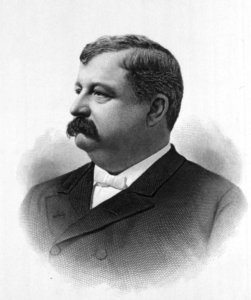
The author of this letter, John Munroe, enlisted as a private in the 2nd Massachusetts Infantry at the age of 19 on May 22, 1861, and served until mustered out on July 1, 1864. During the war he acted as the musician for K Company. 1 Aside from this, not much is known of Private Munroe.
The letter’s most notable character, Colonel William Cogswell, however, was perhaps one of the most famous members of the 2nd Massachusetts. Col. Cogswell served with exemplary distinction during the Civil War, finally being brevetted a Brigadier General. Afterwards, he was three times of the mayor of Salem, five times a member of the Massachusetts House of Representatives, then he was elected to the Senate of Massachusetts in the mid 1880’s. In 1886, Cogswell became a Republican representative in the Federal Congress—a position to which he was reelected to until his death in 1895.2
In one of the many addresses given during the memorial to his life, the speaker attested to his strong character saying:
When heroes were needed, Mr. Cogswell could easily be found. When the tender sympathies of a woman were needed, his heart was loaded with that sweet necessity of life.
His close companions, those whom he loved, knew him to be great in God’s holiest, sweetest, and tenderest gifts, as well as great in the heart that accomplishes the grand achievements of life.
He had a soul fitted to reprove the wicked. He had an arm potential against the oppressor. He had a heart dauntless in the face of danger, ever quick to respond when duty called him to action. The tear of a suffering child, the sigh of an unfortunate woman, and the pitiful look of the debased, all found sympathy in his great soul.3
The anecdote related by Private Munroe in the letter most likely happened towards the end of 1864 after the capture of Atlanta on September 2. General Sherman had appointed Cogswell to be the post-commandant during the period immediately after the completion of the siege.4
Below are the pictures and transcript of the letter.
A “Col” who would not be outdone
At the time the 2nd Regt Mass Inf was in in camp at or near Atlanta, a Michigan Regt was brigaded with it for a while. It being a crack “regt,” a great rivalry fell out between it and the Mass 2nd, also a crack Regiment under Col. Cogswell, and the latter had the better of the competition.
One day a wave of religion struck the Michigan crowd. We had been stationed at this place some little time and the Chaplains had begun to get in their work. When Soldiers are marching or fighting they don’t seem to give religion much thought, but when in Camp for a month and the muddy current of life settles a little it is very different.
At this particular time a regular revival broke out in the Michigan Regt. The Col himself was given that way, and you could find about as many Hymn books, as decks of cards about his Hd. Qs.* and as he rather led this return to a better and brighter life many of his boys naturally fell in and followed. Cogswell’s regiment, on the other hand, was decidedly a perverse and stiffnecked generation. If there was any religion in that regiment it was a secret and none ever knew it. One day while the Michigan revival was at its heighth [sic] an Officer was talking with Cogswell about it.
“Do you know, Colonel,” he said to Cogswell, “I understand that eleven of those Michigan fellows are going to be baptized to-morrow?” “The deuce they are!” said Cogswell, & all of scorn and incredulity. He thought he saw a scheme to outdo his brave Second Mass. He determined to thwart it. That evening on dress parade he addressed his regiment. He told them of the Michigan regiment and how eleven of them were going to be baptized in the river next morning.
“Now boys,” said Cogswell, and his voice trembled, “the Second Massachusetts can’t stand this. We’ve outfought, outmarched and outdrilled these Michigan men, and can repeat all of these solemnities any day in the week. They know it, too, and so ever they try to make a mean, sneaking detour, as it were, and give us the go-by in religious matters, thinking to catch us asleep and not at home, now Boys, if I were to call for volunteers to charge a battery of siege guns, or to just march calmly out to die there would be but one response. And that would be the Sutler. Every man but the Sutler would step forward on the instant. To save the honor of the regiment then, when it is so insidiously beset by those people from Michigan, I now call on you for an unusual sacrifice.”
“And boys,” continued Cogswell, in tones of deepest feeling, “I don’t want you at this crisis in the career of a noble regiment to whose undying fame we all have contributed our blood, to weaken or hang back. Eleven of our rival are to be baptized tomorrow morning, and I now call for 25 of my brave fellows to volunteer to also be baptized. We’ll see their 11 and go ____ 14 better.” The line hesitated a moment, and at last a soldier asked for further & fuller light. “Are you going to be ‘mersed [sic for immersed] too, Colonel?” he inquired. “I will never,” said Cogswell, “shriek from a peril to which I invite my men.
“Should the Col of the Michigan regiment attempt any trick of personal baptism, I too, will go. Should he baptize any of his Officers, officers of equal rack in the 2nd Mass will be there to uphold the honor of their Regiment.”
“As the story comes to me now, it would seem as a first play these people meditate only the baptism of eleven privates, and to it rests with you my men, to say, whether at this juncture their plot shall succeed, or whether with 25 brave volunteers for this special duty we will retain our proud prestige as the crack regiment of this Brigade; and the unmeasured Superior of this particular outfit from Michigan.”
The 25 Volunteers stepped forward, and Cogswell issued an order to the Chaplain to baptize them at the same time and place with their hated rivals.
Truly Yours,
John Munroe
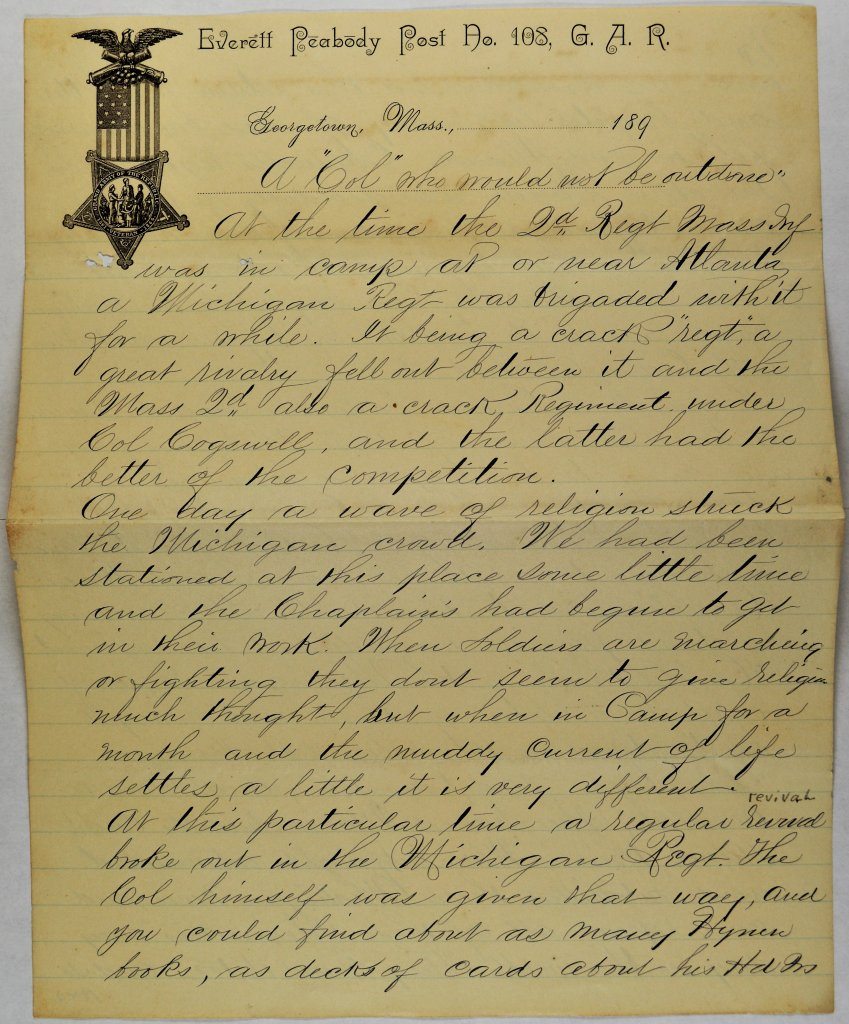
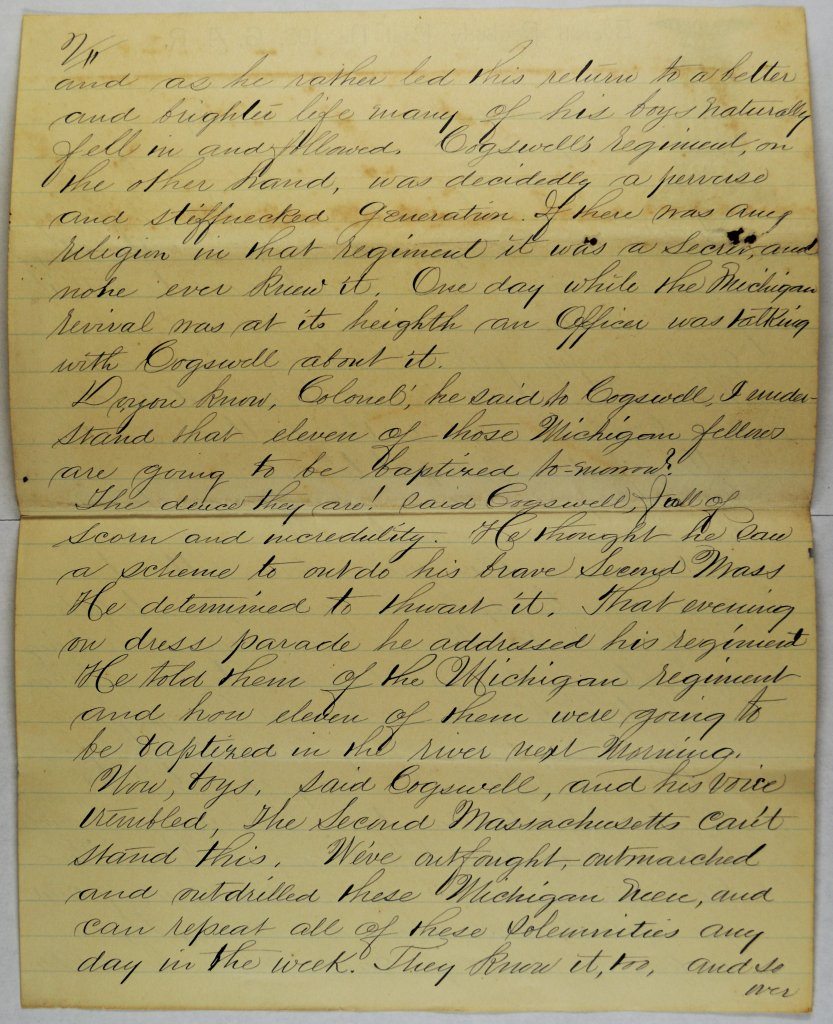
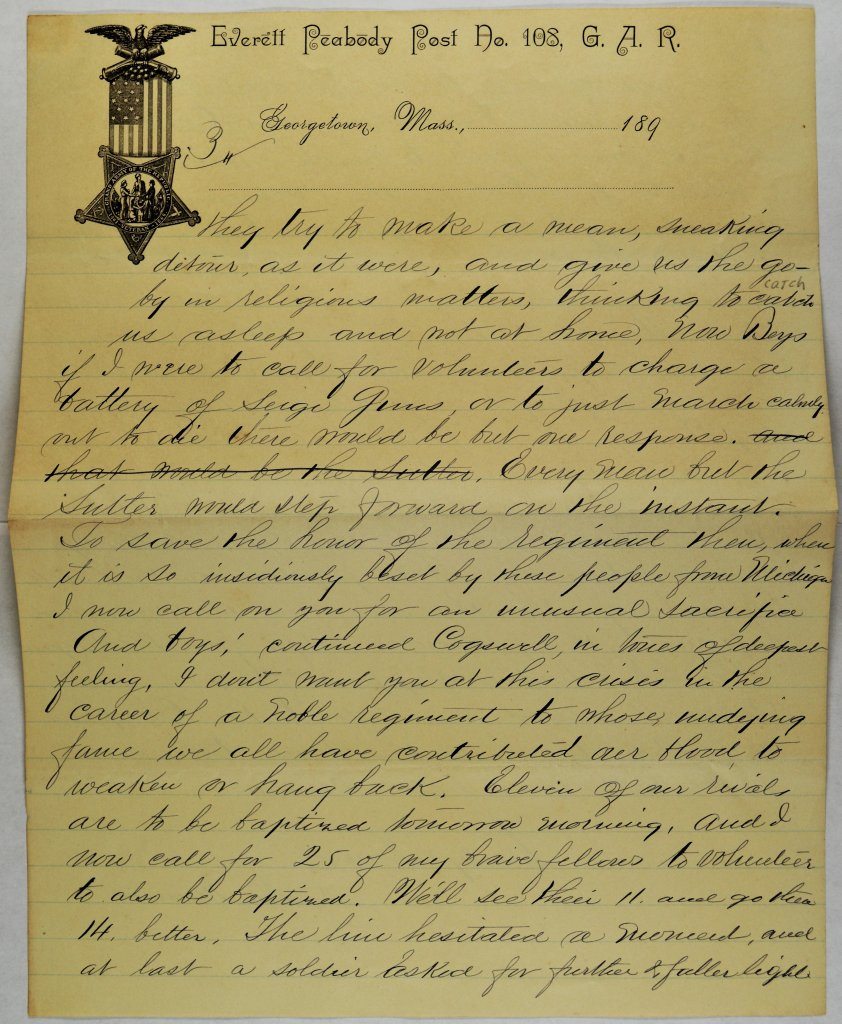
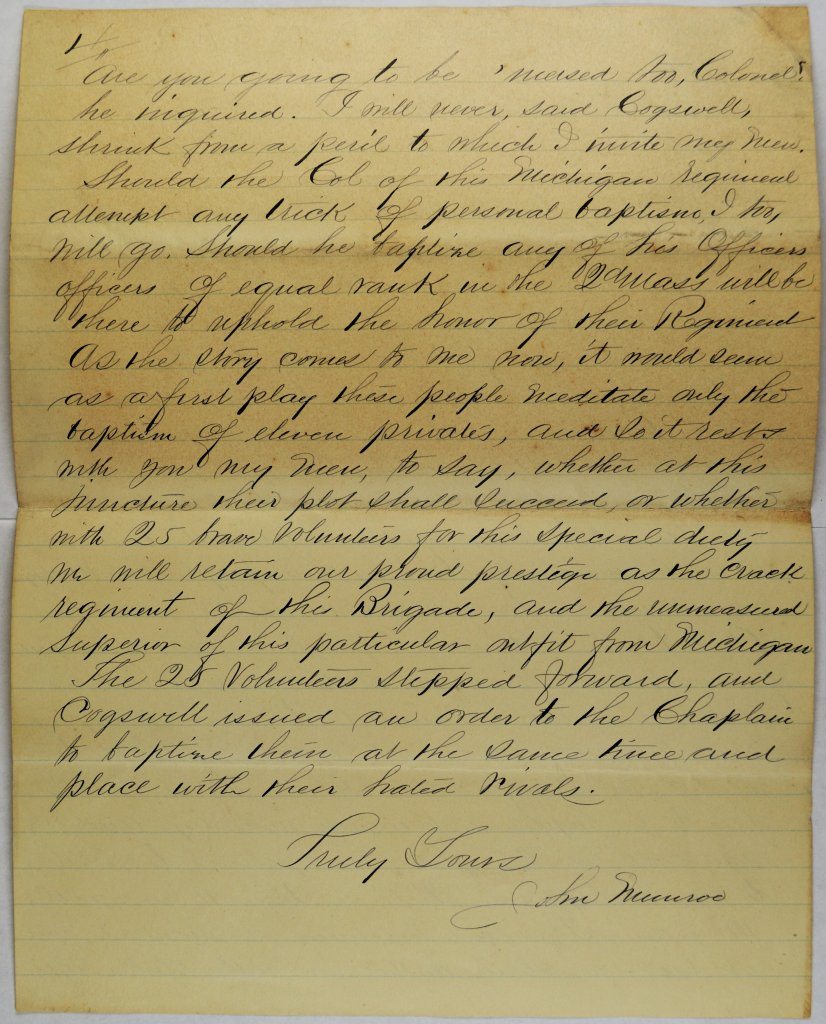
Endnotes
1 Alonzo H. Quint, The Record of the Second Massachusetts Infantry, 1861-65 (Boston: James P. Walker, 1867), 425, 469.
2 “Address of Mr. Moody,” Memorial Addresses on the Life and Character of William Cogswell (Washington: Government Printing Office, 1897), 19.
3 “Address of Mr. Henderson,” Memorial Addresses (1897), 38.
4 “Biography: William Cogswell,” American Battlefield Trust, accessed December 13, 2023, https://www.civilwar.org/learn/biographies/william-cogswell.
Still looking for answers? Visit our FAQ page
More Resources
Know the Truth and Protect Your Freedoms.
Still looking for answers? Visit our FAQ page
Stay Informed with the Latest Resources
Enter your email address to receive our regular newsletter, with important information and updates right in your inbox!










